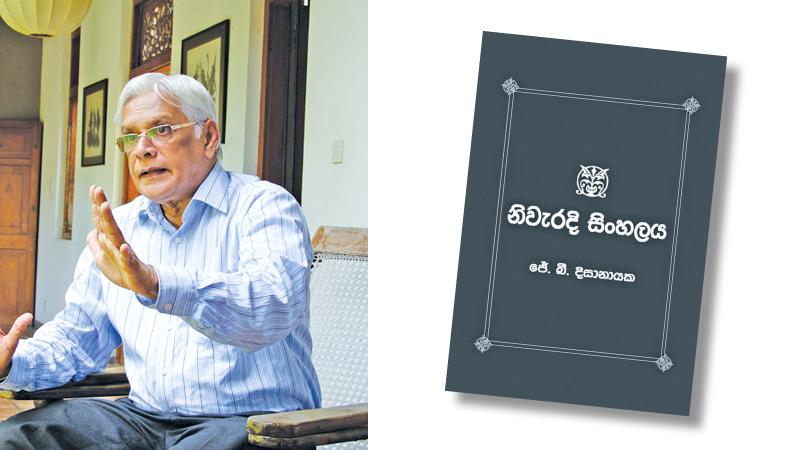
Well known scholar and linguist Prof J.B. Disanayaka published the second edition of his book, Correct Sinhala (Nivaredi Sinhalaya ’), recently. This book shows us how to use correct Sinhala language and the consequences of incorrect usage. Prof. Disanayaka spoke to the Sunday Observer about his book and the current usage of the Sinhala language in Sri Lanka.
Excerpts:
Q: How do you introduce this book to the public?
A: As the title says, it is good Sinhala or correct Sinhala. This is a handbook stating how to write good or better Sinhala. Today if you look at the media or modern writing you would notice a series of incorrect usages. Some people fear that before long the entire grammar of the Sinhala language might be destroyed. Therefore, I wrote this handbook or guidebook explaining how to write good or better Sinhala. Starting with the letters on correct spelling, word phrases, constructing sentences with a subject, object, verb and the different parts of grammar I have set apart sections on writing good Sinhala.
Q: But there is a question on the definition of good Sinhala?
A: Yes. It is a basic question. If I say this is good, how do you know this is good. Look at the title of my book. It is Nivaradi Sinhala or Correct Sinhala. The majority of Sinhala writers use this pronunciation, but a small school of purists, for instance, the Hela Haula movement says it is wrong. Then who decides the correct one? My argument is that correctness of language is decided by the majority of the users. This is an idea I gathered from Sidath Sangarawa, the oldest book on grammar that we have today. In Sidath Sangarawa there is an important axiom called ‘Waharanu Seren Sapaya’ which means, correctness of language is decided by its usage, not the other way. If something is used it is correct.
But here, it doesn’t mean used by anybody. The editor of Sidath Sangarawa further says ‘Anuru se piyonan, that is, according to the usage of the learned. Hence, in language something is correct or incorrect depending on whether it is used by erudite writers.
In the olden days the erudite writers were Vidyachakrawarthi, Gurulu Gomi, Ven. Dharmasena, Second King Perakumba. Today, although they are no more, we have in their place, the modern learned people. In this book I have selected seven such writers of the modern period. They are Munidasa Cumarathunga, Martin Wickramasinghe, Ediriweera Sarachchandra, Sucharitha Gamlath, Vinee Witharane, E.W. Adhikaram and Ven. Soratha. I have selected these modern writers and used their language as the correct one. In other words if some word or sentence is used by them that is taken as correct.
Q: But some of the writers you mentioned are very much different from each other in their writing methods.
A: Yes. But grammatically they are all agreed. They spell words correctly. They present sentences correctly. The subject may be different but their sentences agree with the usage.
Q: Sometimes their word spellings or are clearly different.
A: That is not an issue. In this country except for a couple of writers such as, Siri Gunasinghe and Ajith Thilakasena, all the others follow the rules of spelling related to the use of Ns and Ls – Dental Ns and Cerebral Ns . Dental Ls and Cerebral Ls . Nevertheless, 99.9 per cent of the people in the country agree on the usage. If some do not agree with the usage it is only a minority. The fact that one doesn’t know how to adopt the correct usage is a different matter. There is agreement on the set of rules we should follow. However, in my book I have pointed out some of the common spelling mistakes we make. In language there are some common errors which I have addressed in a whole section of the book.
· Today in every printed and electronic media we see incorrect usage of Sinhala.
We do not care about the language. There is a TV advertisement that says, ‘People who are not selfish make the world better’ or ‘ . It’s a wonderful advertisement but how about the grammar. It is totally incorrect. We do not know whether there is a subject and a non subject. There is a precise distinction between subject and non subject. In the Sinhala language, you can’t use the non subject as the subject in a sentence. Also, you have to use the verb according to the subject. So it is up to the media to check the grammar and use it only if the grammar is correct. People in the media think these are not major errors. They do not know that one mistake in the newspaper is read by thousands of people. Also when there is a mistake little children assume that the elders’ writing is correct.
Grammar and spelling usage cannot be learned overnight. It needs to be learned over a long period of time, from one’s school days.
Q: When we speak about correct spelling sometimes there are more than one correct form for the same word?
A: Yes. Sometimes there are two correct spellings for a word. In the English language, for example, the words colour, theatre, harbour are also spelt as color, theater, harbor. The former is British English, while the latter is American English. In this way we can identify two correct spellings for the same word. One must decide which one to follow.
In language it’s possible to have more than one correct spelling. There could be two correct ways to spell a word. If someone thinks his is the only correct form and all the others are wrong it’s incorrect.
The problem of the Hela Haula movement is that they think they are correct and all others are wrong. In language nobody can say theirs is the only correct way.
